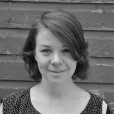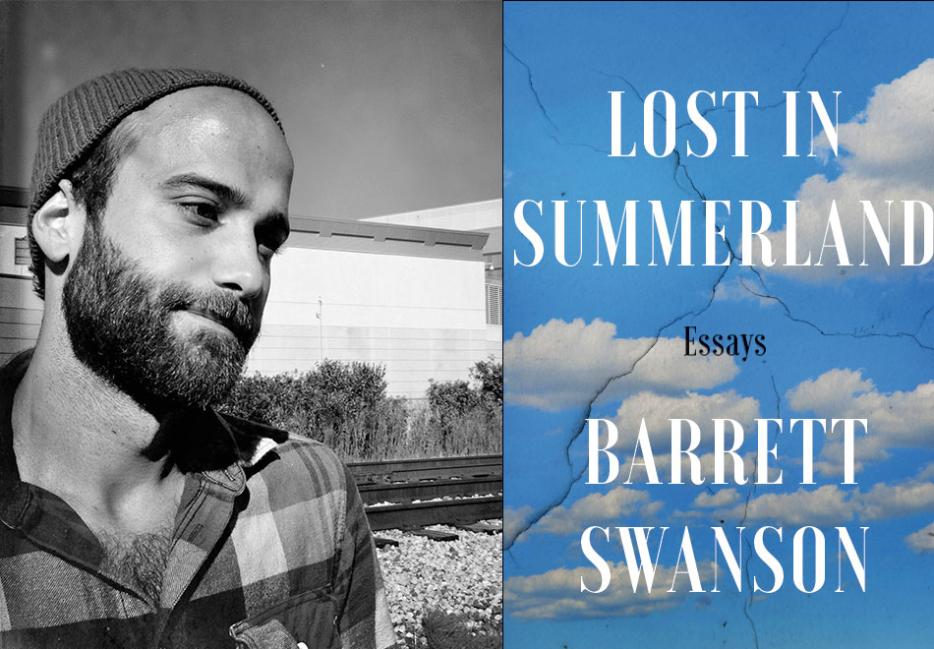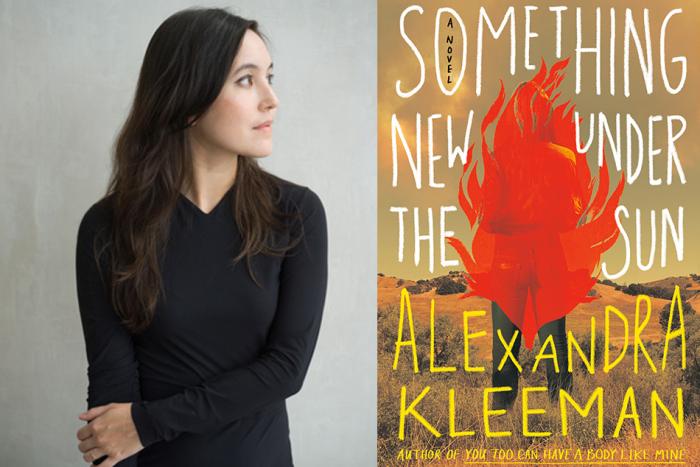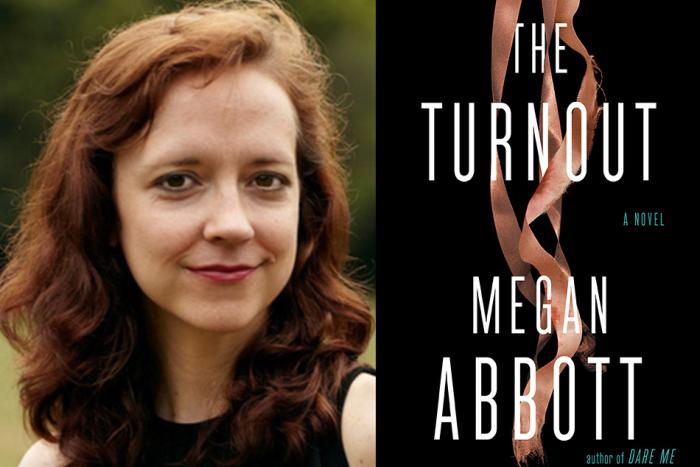When I first encountered Barrett Swanson’s essay “Lost in Summerland”—a reported piece about a road trip to a Spiritualist convention taken in the wake of his older brother’s traumatic brain injury and its resultant (possible) psychic powers—I couldn’t stop sharing or talking about it. Credit to my friend Chelsea, who passed me the story in the first place. Or maybe she tweeted it out? I can’t remember. This was in the old world, at the end of 2019. I was still technically on Twitter then, though my attachment was frayed: I’d recently downgraded from a smart phone to something less interested in knowing me, and I’d put a block on my computer to prevent access to the site most of the week.
I say all this so you’ll understand that it was a moment of real coincidence—not just an algorithmic belch passing as synchronicity—when Swanson, who is not on social media at all, came across an essay I’d written three years earlier and sent me an email just days after I’d appointed myself a proselytizer for his work. We struck up a sort of low-key pen pal-ship.
Swanson’s debut collection of non-fiction, also Lost in Summerland (Counterpoint), is a blend of empathetic reporting and incisive thinking that takes the reader on a guided tour of America’s wild, imaginative, and sometimes dangerous myths. Follow him into a mouldering futurist’s Floridian swamp-palace; down the rabbit hole of true crime conspiracies haunting the economically fragile Midwest; into the literal rubble of a Disney-inflected FEMA disaster simulation training centre. In a book about the power and limitations of narrative, Swanson’s essays search out older, maybe kinder ways to say new things. Lost in Summerland reminds us that a good and well-told story can, sometimes quite literally, save a person’s life.
In keeping with our pre-existing correspondence, Swanson answered my questions by email.
Suzannah Showler: Is it cheating if I start by asking you about something we’ve talked about a little bit before? A number of the essays in Lost in Summerland are dispatched from communities and subcultures that you have some kind of affinity with or para-relationship to but are not all the way inside of (psychics; anti-war veterans-turned-farmers; a men’s group/corporatized toxic masculinity recovery retreat; West Wing cos-players, etc.).
I was wondering if you could start by saying something about that insider-outsider thing, and how it works for you both when you’re immersing yourself in something in the first place and when you’re writing about your experience after the fact?
Barrett Swanson: Oh, god. Where to start. I suppose the insider-outsider thing begins for me with the very scenario of writing longform magazine pieces, in part because I'm trained as a fiction writer and so most of my instincts are utterly different than those of a quote-unquote real journalist. (I would gasp for want of breath if I mentioned all the times when my inexperience or lack of training made me look like an absolute lummox with editors; I remember very distinctly, for instance, having to look up the term “nut graf” after receiving an editorial note during my first time writing a magazine piece). Setting aside the clinical levels of shame and imposter syndrome I'm apt to feel in such moments, I’m inclined to think that my inexperience—my outsider status in the magazine world—has served me well, because I tend to come at a place or a subject with an infant-like blankness in terms of what I’m “supposed” to do with the topic. All my writerly antennae are instead tuned to the emotional voltage of the situation as opposed to whatever would supposedly make for a “good” piece of magazine journalism.
I guess this goes some way toward explaining my approach when it comes to entering into these subcultures. Basically, I'm trying to immerse myself as much as possible in the intellectual and emotional frequencies of the experience. My whole goal, at least for the first few hours (or days or weeks, depending upon the extent of the reporting), is to disappear. Joan Didion has this great thing about how her slightness physically causes people to forget that she’s in the room and makes them more likely to reveal themselves. I guess I try to do a similar thing, at least dispositionally. I want to be so open and receptive to the people I’m meeting that I’m basically a mirror, so that they take me as one of their own. Possibly that sounds Iago-ish, or something, particularly because so many of the groups I cover are zany or a little out-there, maybe, but as you mentioned, I almost always choose topics that intersect in some way with my own life. I wrote about anti-war veterans because I teach a lot of people who served in Iraq and Afghanistan, which made me think about the debts I might owe them. I wrote about psychics and mediums because after my brother had a traumatic brain injury, he started having paranormal experiences. If there’s one thing I think I’m halfway decent at as a reporter, it’s my ability to chameleon myself onto the psychic ambiance of the situation. Sometimes this can be physically and spiritually exhausting—the men’s retreat piece, for instance, was a veritable Iliad of emotions—but I think there’s a deeper dimension to this, because this effort, at least for me, is born of the impulse to consider how I’m implicated in the topic I’m writing about.
One thing of things that I found really exhausting as a graduate student was that we were constantly encouraged to read texts “suspiciously”—or with what gets called “the hermeneutics of suspicion”—which assumes that the text contains biases and subterranean arguments that a reader must unearth and bring to light. One assumes that the author is the enemy and so we must constantly bloodhound around, looking for signs of contradiction or symptoms of bad faith. While this critical stance has much to recommend it, I can’t help noticing how this suspicion has infiltrated the larger culture and has become our default mode of interacting not only with texts, but also other people and the outside world. This seems particularly prevalent in a lot of non-fiction writing, where the whole aim and objective is to eviscerate one’s subject in ways that flatter social media algorithms and rack up a lot of retweets. I am sick to death of this kind of writing—the dunks and pile-ons, the takedowns and hot-takes. Such mercilessness seems so easy and is so utterly antithetical to what I take to be the artistic imagination. And so, I have turned to a different mode of critical reading to inform my headspace when reporting. One of my friends, the essayist Jon Baskin, has written about how the philosopher Stanley Cavell practices a type of interpretation where the hermeneutics of suspicion are trained not on the text but on the reader themself. Cavell wants us to ask, “How is the book implicating me? How is it exposing aspects of myself that I normally keep hidden?” For me, the act of reporting functions as a similar form of introspection. What does this subculture expose about me that I don’t want to confront? How am I culpable or complicit? Which is another way of saying: how is the reader complicit? If a piece isn’t asking this question, I’m not interested in reading it. It is laughably easy to point and sneer—far harder (and more artistically daring) to acknowledge one’s own place in all this.
I’m very much with you on all of this! And that’s more or less where your book starts, right? The opening essay is about a moment when you run up against the limits of that mode of suspicious interpretation and it provokes a kind of crisis of narrative. Or a life crisis within narrative. I read the rest of the book with that “end stages of suspicion” feeling in mind—I saw it as being as much about its subjects as it is about re-building a relationship to narrative.
Since you mention the kind of writing you’re sick of—what are you not sick of? What are you loving, or wish you saw more of? Also, kind of a left-field question, but what did you love reading as a kid, or before your brain was colonized by suspicion?
In terms of contemporary essayists, I really love the work of Elif Batuman, Rachel Kaadzi Ghansah, and Elisa Gabbert. While I admire all of her work, Batuman’s recent essay about Zoom versions of Greek tragedies during the COVID pandemic was easily the best thing written in the past year, which is why I’ve become a diehard evangelist for that piece; so much so that my students have to tell me “enough about Elif Batuman already.” Ghansah and Gabbert I love for similar reasons—all three are committed to tunneling into their experiences alongside whatever subject they’re covering in a way that ensures that they almost always have skin in the game. They are almost always risking something either emotionally or intellectually. I’m also a diehard fan of Sheila Heti, whose last two books—How Should a Person Be and Motherhood—I have begun to interpret as a strain of spiritual writing, inasmuch as this is a writer who’s willing to take the moral decisions in her life seriously and without embarrassment. I aspire to that kind of unswerving candor, and I can’t wait to see what she does next. I also teach Virginia Woolf for school, and because she is my heart’s true friend, I never get sick of her stuff. My students make fun of me for it, but I get pretty worked up whenever I get to the Septimus section of Mrs. Dalloway, or when Clarissa finds a way to forgive Miss Kilman, the religious woman, who’s stealing the attention of her daughter. Here’s one of my favourite passages, where Clarissa’s thoughts swerve from hate to sympathy: “Odd it was, as Miss Kilman stood there (and stand she did, with the power and taciturnity of some prehistoric monster armoured for primeval warfare), how, second by second, the idea of her diminished, how hatred (which was for ideas, not people) crumbled, how she lost her malignity, her size, became second by second merely Miss Kilman, in a mackintosh, whom Heaven knows Clarissa would have liked to help.” How many of us suffer from a similar misapprehension, mistaking people for ideas—and ideas for people?
Reading-wise, as a kid, I was pretty into Stephen King. I think the first truly “adult” book I read at age 11 or so was It, which for about thirteen different reasons—not least among them my innate sensitivity and anxiety—was a mistake. Even now as an adult, whenever I hear the pipe organ intermezzos of your standard carnival music, I’m apt to suffer PTSD-grade flashbacks from that early encounter with Pennywise. What else? I was a pretty committed athlete as a little guy, so I remember inhaling lots of sports biographies, alongside the journals of Kurt Cobain (was I ever so young?), and then whatever teachers got me into from school—Ethan Frome, The Red Badge of Courage, and Edgar Allan Poe. Pretty morbid stuff for a middle schooler, to be honest.
When I was reading Lost in Summerland, I found myself repeatedly cross-referencing any mention of your age against historical time markers and trying to suss out if we’re born the same year.
Even as I was doing this, though, I was like: why does this matter so much to me? Partly I am just an annoyingly self-interested reader, and I was looking to have the sense of generational recognition I felt coming through in these essays affirmed. But I wondered whether you might resist being read as a generational writer when so many of these essays are, in one way or another, about complicating grouping people according to type (which is maybe another way of mistaking people for ideas, ideas for people).
Also, follow-up before you’ve even answered: if we are the same age or proximate, can I ask you my new favourite thing to ask people our age? Do you think of yourself more as an old young person, or a young middle-aged person? Or are both totally unappealing and/or not of interest? Maybe not everyone is quite as obsessed with parsing degrees of aging as I am.
It’s funny because as I was reading your (incredibly brilliant) poetry collection, Thing Is, I had a similar hunch that we were about the same age. As you rightly suspect, the generational thing is tricky for me, not least because I’m wary of being seen as a gold-star-earning millennial, but also because I’m interested in the way that so many of our social issues have been radically de-historicized. Many of the essays try to suggest that whatever we might see as our unique or “unprecedented” social problems (pandemics, cataclysms, the evaporation of truth and consensus) actually have both ancient and modern precursors that might be useful and instructive. (For instance, part of the reason I decided to teach Mrs. Dalloway again this semester is that it’s fundamentally a pandemic novel; that first line—about Clarissa “buying the flowers herself”—suggests this is the first errand she’s undertaken since being bedridden with the influenza virus). Possibly the most salient example of this in the collection is the note about how spiritualism—what with its seances and table-tipping—roughly coincided with the death of God and the birth of capitalism, two phenomena that torpedoed most of the reigning assumptions that Americans had about reality. I try to make the case that this mirrors our own present culture’s interest in astrology and New Ageism, which is an attempt to find order and meaning in the wake of Trump and post-truthism.
And about the aging thing. Oh, god, Suzannah. I don’t know. I teach four classes a semester at a Midwestern university, so mostly I just feel old. For a while, I used to pride myself on being the hip young professor, but this year especially I have fallen so behind on the argot and lingo that I essentially feel like a senior citizen. Because we are holding online classes for the pandemic, the students tend to use the chat feature a lot during our web conferences, and they might as well be typing Sanskrit. Plus, when you go bald in your early twenties, as I did, you’re forced to reckon with the questions of aging at a breakneck velocity. While your friends head to the liquor store to grab provisions for a party, you’re traipsing over to Walgreens for a fresh bottle of Rogaine.
More seriously, though, if there’s an extent to which I feel “young,” it’s owing to the fact that I haven’t yet been able to afford some of the major assets we might otherwise associate with one’s entrance into middle-age. There was a great piece in n+1 maybe like ten years ago about how all the complaints regarding millennials’ arrested development ignored the extent to which student loan debt has skyrocketed across the last half century, and the idea of financial solvency before the age of 40 was either a matter of extreme class privilege or an out-and-out pipe dream.
Speaking of the hallmarks of “adulthood” (scare quotes necessary), I want to ask you about the role marriage plays in the book. Your wife is in a lot of these essays, providing little glosses and tethers. And then marriage as a concept is more explicitly explored in the last essay, “A Church Not Made with Hands,” which I’m really trying not to spoil right now.
I happen to really love being married a weird and identity-making amount, and I often feel like a huge square about it. But you seem to be arguing for coupling as a kind of ethical practice (in a way that reminded me of Kierkegaard’s Either/Or, actually, which you bring up when describing Sheila Heti’s work). I was wondering if you could say more about what you’re up to here? (And can you tell me that it’s cool to like marriage?)
I’m roaring with laughter at this question because I, too, feel like a huge square about my love for being married. Kierkegaard was very much on my mind throughout “Church Not Made with Hands”—not only Either/Or but also Works of Love, particularly his stuff about how to treat one’s “neighbour.” As it happens, I’m currently writing a piece about marriage and the screwball comedies from the 1930s and ’40s (think: His Girl Friday and The Awful Truth; think: My Favorite Wife and Adam’s Rib), which my wife and I have been re-watching during this last phase of the pandemic. Not only do these movies make me revere, afresh, directors like Leo McCarey and George Cukor, but I am also just endlessly dazzled by Irene Dunne and Katherine Hepburn, whose wit and on-screen voltage is so pyrotechnically compelling. Anyways, Stanley Cavell (who is increasingly becoming a really important thinker for me) wrote about these films in an insufficiently celebrated book called Pursuits of Happiness, where he characterizes them as “comedies of remarriage,” in which the spouses divorce or separate at the beginning of the movie but, via a maze of side-splitting circumstances, come back together in the end. For Cavell, the salient feature of these films is how the spouses eschew new experiences for new ways of apprehending their experiences—i.e. rather than trading old lovers for new ones, they learn to reanimate their marriages through heroic leaps of perception, little dramas of “forgiveness,” which he describes as a forfeiture of revenge. He (somewhat provocatively) argues that the calisthenics of intellect and emotion that are necessary for marriage are the same ones required of us in the operations of a democratic society.
More broadly, though, I think I find marriage intellectually compelling because it can function as the central narrative of our lives, one whose success depends upon our continual re-enchantment. In this way, its habits of mind resemble those of religion—elsewhere, I’ve described marriage as “the theology of us”—where the survival of the relationship depends on a shared interpretation of experience, a hermeneutics of affection. And I guess if we apply Cavell’s logic to this end, it would seem to suggest that sometimes failures of relationships can be the result of bad storytelling—bad interpretation. And maybe certain moments in my book suggest that the social contract—like that of marriage—can fail because of similar narrative deficits.
Now that your book is entering the world, is there anything new you’re working on now that you can tell us about? And what, whether writing-wise or other, are you looking forward to this summer?
I have a piece in Harper’s about a long weekend I spent inside a TikTok collab house, which was upsetting for about eleven different reasons. And I also have another essay that will run in Lit Hub about my experiences in a professional singing and dancing group when I was kid (long story). But apart from the aforementioned piece on the comedies of remarriage, I’m currently writing a long essay about forgiveness, and I’d like to do a reported piece on elephants, assuming anyone will let me write it. I’m also taking a stab at writing fiction again. Mainly, though, I’m trying to figure out how to preserve a sense of self that is not beholden to algorithms and to regard myself and the members of my community with imagination and patience.






